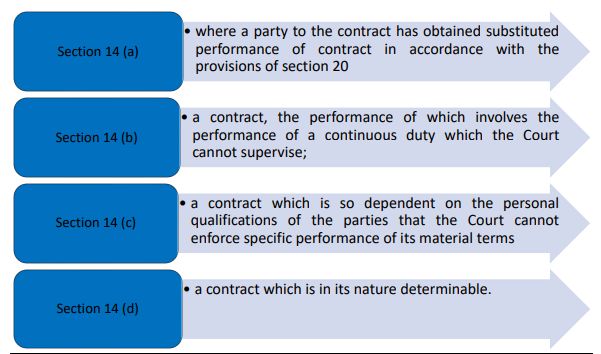- within Energy and Natural Resources topic(s)
Introduction
A contract is a legally binding arrangement entered into by two or more parties. The parties to the contract are expected to adhere to their respective responsibilities and terms and conditions stated in the contract. Whenever there is breach of contract due to non-performance by either party to contract, the aggrieved party is entitled for monetary compensation or damages or specific relief under the provisions of the Specific Relief Act, 1963 (as may be amended from time to time) ("Act").
Specific Relief Act, 1963
Specific performance of contract means adherence to actual terms of the contract, which parties have mutually agreed. For example, if A agrees to sell a plot of land to B and after the payment made by B, if A refuses to sell the plot, then B through specific performance is entitled to recover the possession of that plot and not accept any other damages or compensation in lieu thereof1. Section 10 of the Act states that the specific performance of a contract shall be enforced by the Court subject to the provisions contained in sub-section (2) of section 11, section 14 and section 16.
The Specific Relief Act, 1963 has been recently amended in 2018, based on the recommendations of the Expert Committee to the Government of India submitted in 20162.
The amended Act makes the specific performance a general remedy and diminishes the discretionary power of the Court for granting specific performance. This amendment was proposed to keep pace with the extensive infrastructure growth, and enormous commercial activities including foreign direct investments. The amendment has been enacted to act as a deterrent for indiscipline and to minimize judicial intervention in enforcing specific performance of contracts.
Exceptions to Specific Performance under Section 14 of the Act
The amended provisions of Section 14 of the Act, specifies contracts which cannot be made specifically enforceable:

a) Substituted Performance: If a party to the contract has obtained a substituted performance of the contract, then the provisions of section 20 of the Act shall apply and the contract cannot be specifically enforced. If the affected party obtains substitute performance through a substitute, it waives off its right to specific performance under the provisions of the Act but may claim damages or compensation. For example, A agrees to sell a car to B. A subsequently refuses to sell the car, and B purchases the car from C. Here it can be stated that B has obtained a substituted performance of contract, and thus cannot demand specific performance, but can always claim compensation towards damages, penalties or cost caused for fulfilling the terms of contract on behalf of B by using substituted performance.
b) Performance of a continuous duty which the Court cannot supervise: If a contract specifies any specific duty which is continuous and cannot be monitored by the Court, then, the contract cannot be specifically enforced.
c) Personal qualifications of the parties that the Court cannot enforce specific performance of its material terms: If the contract depends on personal volition of the parties or the skills and experience of the parties, then it cannot be specifically enforced. For example, A who is a singer enters into a contract with B to perform at an event. A cannot perform at an event, thus, there is a breach of contract. B cannot demand specific performance of contract, but B can claim damages.
Contracts pertaining to Entertainment or Art Industry
In the entertainment industry, various contracts are entered into with artist, actors, musician, director etc. The contracts which are entered into with respect to the services or the artwork, is for a very unique or an individualistic quality. For example, an actor is signed on for a particular film due to his acting capabilities, or an art work is sold for its uniqueness and the style of a particular artist. These contracts or agreements are known as personal contracts and are specific to the person's personal skill and style and as such cannot be performed with same effectiveness or if performed by any other person may not generate the same results.
In such cases, the Court does not compel the parties to the contract to specifically perform the contract against their will and this has been the legal position for more than a century now3. In case of a breach of a personal contract, the aggrieved party shall be entitled to monetary damages.
Case law: Svf Entertainment Pvt. Ltd vs Mr. Anupriyo Sengupta on 30 April, 2018, Kolkata High Court4
In this case, the petitioner was a producer, and the respondent was an actor who had entered into an exclusive agreement with the petitioner (containing a cogent restrain clause to work with other producers), to impart his services for a series of films. However, the respondent had approached other production house. Considering this breach, the petitioner invoked legal remedies for enforcement of the exclusivity and to recover its investment on the respondent, exceeding Rs. 1 crore. The petitioner claimed that the respondent's acting skill and brand were developed by him, as the film and role were unique, and loss of this cannot be compensated in monetary terms. The interim relief was denied, and the Court stated that:
"it is prima facie apparent that the contract involves the performance of the service by the respondent which are purely personal and the specific performance of such contact by the respondent would be prima facie barred by clauses (a), (b) and (d) of sub-Section (1) of Section 14 of the Specific Reliefs Act, 1963. The contract between parties is purely a contract for personal services of which specific performance cannot prima facie be granted. Accordingly, the argument advanced by the petitioner claiming specific performance of the said agreement has no merit in this case."
d) A contract which is in its nature determinable: Determinable contract means revocable contract, or a contract which is at will of the Parties. For example, A, B and C have a partnership. B wants to retire from the partnership. Thus, this contract cannot be specifically enforced if the partnership deed is at will. Although the determinable contracts are not enforceable by Court, the aggrieved party can always claim damages for the loss incurred due to the non-adherence of the terms and conditions of the contract by the other party to the contract.
Case law: Dlf Home Developers Limited vs Shipra Estates Limited & Ors. on 8 November, 20215
The said case was a heavily litigated matter, having multiple parties to the litigation. The Court had analyzed the section 14 (d) of the Specific Relief Act, and the word "determinable" in the context of the agreement and stated that the question whether a contract is in its nature determinable, must be answered by ascertaining whether the party against whom it is sought to be enforced would otherwise have the right to terminate or determine the contract even though the other party is ready and willing to perform the contract and is not in default. In the said case, the Agreement specifically provided for termination only for breach, and thus, this clause was not held determinable by the Court, and specific enforcement of contracts was granted in this case. Further, the Court also emphasized the importance of ascertainment of the nature of the contract and the intention of the parties and specifically determined whether the parties intended the contract to be determinable and thereby, not specifically enforceable and held that:
"Plainly, if in terms of the express language of the contract, the parties have agreed that their contract will be specifically enforceable; the courts would have to assume to the said effect. This is not to say that the courts are bound to issue an injunction or specifically enforce the contract; but it would certainly require to give due consideration to the intention of the parties. Clause 10 of the agreement expressly stated that DLF would be entitled to specific performance of the agreement as the Sale Property is a special one and a similar property is otherwise not easily available. Thus, considering this clause and the express agreement of the Parties, Court granted the injunction and stated that the contract is required to be specifically enforceable and it is clearly not open for any party to contend to the contrary."
This judgement was passed in 2021, after the 2018 amendment but the provision relied on by the Court has not been amended (apart from numbering) and thus the Court has not elaborated in detail on the applicability of the 2018 Amendment.
Conclusion
The exceptions as enumerated in Section 11(2), 14 and 16 list the circumstances under which the aggrieved Party cannot claim specific performance of the contract, but it can claim only damages or monetary compensation as a remedy. Though the 2018 amendment, is substantive in nature, it is not clarified whether this is a prospective amendment or a retrospective amendment. There is ambiguity in the law and conflict in the judicial approach for application of the amendment and some of the instances of judicial divergence are listed below:
- Kolkata High Court in the case of Church of North India Vs. Ashoke Biswas6 applied the amendment retrospectively;
- High Court of Allahabad in the case of Mukesh Singh and others vs. Saurabh Chaudhary and others7 also applied the amendment retrospectively,
- High Court of Karnataka in the case of M Suresh Vs. Mahadevamma and others8 has applied the amendment prospectively.
As a general principle of law, whenever there is a substantive change in law, enforceability is to be made prospectively. This ambiguity may hamper the purpose of the amendment, which was to reduce judicial intervention in performance of the contracts.
* This article reflects the general work of the author and the views expressed are personal. No reader should act on any statement contained herein without seeking detailed professional advice.
Footnotes
1 Ram Karan v. Govind Lal ;A.I.R. 1999 Raj. 167
2 Expert Committee's Report on Specific Relief Act, 1963 submitted on 26th May 2016.
3 Ram Charan Bajpayee vs Rakhal Das Mukherjee- 1913, 41 Cal 19
4 Ordinary Original Civil Jurisdiction, A.P. 1160 of 2017
5 2021 SCC OnLine Del 4902
6 Civil Revisional Jurisdiction, C.O. No. 863 of 2019
7 2019 SCC (All) 5523
8 2020 SCC (Kar) 3425
The content of this article is intended to provide a general guide to the subject matter. Specialist advice should be sought about your specific circumstances.

